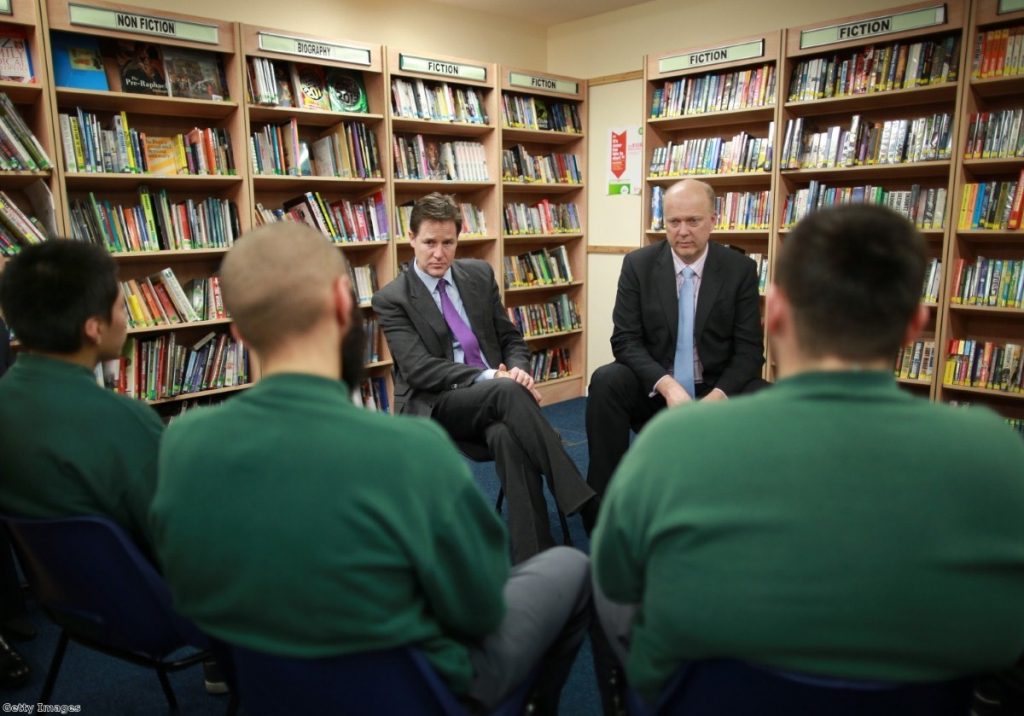Prison book ban: Grayling hits back at critics
Chris Grayling has hit out at critics of his decision to ban prisoners receiving books, saying the rule is necessary to improve rehabilitation rates.
Following a day of growing outrage at the row, the justice secretary wrote a piece for Politics.co.uk saying the move was part of making inmates "earn priviliges".
"Let's be clear about one thing: prisoners' access to reading material is not being curtailed," he said.
"All prisoners may at any one time have up to 12 books in their cells. All prisoners have access to the library, irrespective of which institution they are being held in.


"If any prisoner wishes to buy books with the money he or she gets from their pay, then that is up to them.
"If a prisoner has engaged with their own rehabilitation in prison, then he will be on a higher level in the Incentives and Earned Privileges scheme, and so would have more money to spend – on books if he so chooses."
He added: "It was never the case that prisoners were simply allowed unlimited parcels – books or otherwise. Such a situation would never have been secure or practical.
"What has happened is that we have introduced consistency across the estate."
News of the restriction on prisoners being sent parcels – including books or magazine subscriptions – spread rapidly last night after a Politics.co.uk comment piece by Howard League for Penal Reform chief executive Frances Crook branded it "nasty" and "bizarre".
Crook hit out against the government argument that prisoners were still able to acquire books by spending their prison work salary on them in a new statement this afternoon.
"The reality is that most prisoners on an 'entry' or 'standard' regime will be allowed no more than £10 or £15.50 a week, which means that almost all a prisoner's weekly allowance would be spent on just one title," she said.
"Even the most ardent book lovers tend not to spend all of their weekly wage on what they read."
She added: "It is common for prisoners to spend 20 hours a day in their cells during the week. At weekends they can be cooped up from Friday lunchtime until Monday morning.
"In those circumstances it is the little things that make a difference. Being able to read a book is a lifeline and a way of nourishing the mind."
Labour also waded into the row, with shadow justice secretary Sadiq Khan criticising his opposite number, Chris Grayling, for his priorities.
"This sums up the skewed priorities of a justice secretary who has no solutions to the problems in our prisons," he said.
"If he wanted to truly rehabilitate prisoners David Cameron's government would be encouraging reading, not making it more difficult than it already is."
He added: "Half of all male prisoners have no qualifications and the number of those in jail who can’t read and write is a national disgrace. Two fifths of all prisoners have the average reading age of an 11-year-old.
"This ridiculous policy shows just how low Chris Grayling has plumbed the depths in his approach to running our justice system."
Liberty also attacked the policy, with a mock-up front cover of a novel entitled The Book Thief featuring the justice secretary.

The rule on prisoners being sent packages prevents inmates from receiving any parcel, including books, unless under exceptional circumstances.
Within a month of being introduced, the rules prevented prisoners receiving Christmas parcels, with prison reform campaigners saying that the 200,000 children in England and Wales with a parent in prison were being put under extra stress by being unable to send them a present.
The rule includes basic items such as stationary, books and additional clothing, including underwear. It also includes luxury items like magazine subscriptions.
Instead, prisoners are forced to pay for all items out of their small prison wages with the money going directly to the private firms running shops for inmates.
Individual governors do have discretion to allow in packages under exceptional circumstances however, including medical supplies or items required for religious observation.
Following the Politics.co.uk article, a group of prominent writers, including Phillip Pullman and Linda Grant, have lent their voice to the growing chorus of criticism against the move.
"It's one of the most disgusting, mean, vindictive acts of a barbaric government," Pullman, the author of fantasy trilogy His Dark Materials, said.
Mary Beard, professor of Classics at Cambridge University, said: "Books educate and rehabilitate. Crazy to ban them being sent to prisoners in jail."
Linda Grant, author of the Booker-shortlisted novel The Clothes on Their Backs, said she was organising a protest against the rule while Mark Haddon, author of The Curious Incident of the Dog in the Night Time, said he had started a mission to get "every writer in the UK publicly opposed to this by tea time".
The rule is a "pointless extra punishment, which is not only malign and small-minded but desperately counterproductive", he added.
They were joined by other influential figures from the arts world, including folk singer Billy Bragg, who wrote: "People in prison need rehabilitation, not retribution. Coalition ban guitars, now deny prisoners books."
A Change.org petition has also been set up demanding Grayling revise the rule and is rapidly growing, with hundreds of new supporters signing it every hour.
Adding his signature to the petition, celebrated author Ian Rankin said: "From visits to prisons and talking to prisoners I know how important books can be in promoting literacy and connecting prisoners to society."









